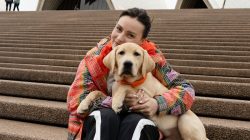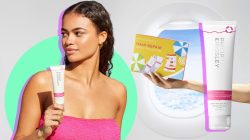Plastic-free, pristine beauty has now become enticingly attractive.
On Wednesday, Aora—a makeup line established by former L’Oréal executive Nour Tayara—will make its debut in the American market. Known for its striking eco-friendly packaging devoid of plastics and its formulations free from harmful substances, the brand aims to captivate consumers focused on cleanliness and environmental responsibility. According to industry experts, Aora has the potential to generate sales ranging from $2 million to $5 million within its initial year stateside, contingent upon securing partnerships with major retailers; talks with various outlets are presently underway. To Tayara, tapping into the U.S. market was essential not only because it’s highly developed regarding clean beauty products but also since approximately one-third of Americans speak Spanish.
The name Aora originates from the Spanish term
ahora
, meaning now.
“The transformation is happening in an industry where, during my tenure, we committed to cutting our plastic usage by half by the year 2030. However, we felt it wasn’t enough—we aimed to achieve this immediately,” stated Tayara, formerly serving as the senior vice president of marketing for Thayer’s Natural Remedies at L’Oréal.
Furthermore, Aora is introducing an updated edition of its Acaríciame Solid Lip Serum priced at $27, featuring five different types of Mexican chili peppers as part of their celebration upon entering the American market. Prior to releasing this product, Aora has partnered with the nonprofit organization RePurpose Global, ensuring that each sale leads to the removal of nine times the serum’s weight in plastic waste from oceans.
Tayara launched Aora in
Mexico
In November 2023, following years of frustration over the amount of plastic
beauty
The industry was utilizing, with much of it ending up in landfills despite this.
recycled
.
“The
makeup
The industry, particularly concerning the vast amounts of waste it generates, is troubling,” he stated, highlighting that black packaging, in particular, often ends up as non-recyclable material. “This issue doesn’t stem from consumers failing to recycle; rather, it’s due to how these products are initially conceived and designed—95% of cosmetics aren’t made with recyclability in mind. They’re simply too tiny for most recycling facilities, which generally won’t accept items smaller than two inches square.”
Despite this, he acknowledged that some plastic-free options existed in the market; however, they did not meet his expectations.
The initial move toward becoming plastic-free should be ensuring that our efforts aren’t merely about being plastic-free for the sake of it. In my view, sustainability doesn’t necessarily drive sales. This might sound radical, but over the last decade, numerous reports claiming that eighty-five percent of Generation Z would spend extra money on eco-friendly products haven’t held up,” he stated. “Consumers tend to invest in superior goods… It wasn’t until companies like Beyond and Impossible introduced their versions that people began embracing plant-based burgers; ten years earlier, dry lentil patties didn’t cut it. Sustainability needs to be appealing too. Indeed, there are now plastic-free lip balms available, yet many come packaged in cardboard.”
Hence, he has adopted a novel method for achieving plastic-free packaging that aligns more closely with high-end products utilizing plastic. Notably, Aora’s palettes are entirely crafted from tin, encompassing even the container itself as well as the mirror, which boasts an innovative finish ensuring reflection akin to a standard mirror.
“The palettes were once a can of soup and will become one again, as tin is more than 87 percent recyclable,” he stated.
The brand’s Solid Lip Serum is entirely composed of aluminum, including the rotating mechanism inside, ensuring it can be completely recycled. In contrast, their lip liner consists of a 100 percent wooden core treated with an oily wax for protection, along with a 100 percent metallic cap; unlike many others available which appear to be wood but are actually made from plastic.
Moreover, Tayara aimed to establish a pristine brand that also exuded fun.
“I think [clean beauty] is somewhat dull,” he stated. “Why does opting for clean require sacrificing color, sparkle, or enjoyable elements, or settling for appearances that are merely an enhancement of my natural skin?”
Aora’s offerings feature vivid colors and unconventional finishes not commonly found in many products. Additionally, the packaging incorporates bright shades like neon orange, hot pink, and cobalt blue.
In addition to his dedication to sustainability and clean beauty, Tayara aimed to honor Mexico through the brand, noting a deficiency in this aspect within the industry. One approach to achieving this is by incorporating Spanish into the product packaging, with Tayara asserting that Aora is uniquely the sole brand in the U.S. marketplace to adopt this practice.
He stated, “Unfortunately, we’re still living in an era where high-end beauty, or luxury cosmetics, predominantly originates from the Northern part of the globe.” He continued, “This isn’t solely about showcasing Southern perspectives; instead, numerous stories, hues, creators, artistic expressions, and cultural elements deserve recognition within the broader landscape of the beauty sector.”
In recent years, Mexico has emerged as an increasingly attractive market, with numerous brands such as E.l.f and Estée Lauder Companies broadening their presence there. More recently though, some homegrown Mexican brands have started aiming for the U.S. market too. This strategic shift aligns perfectly with Tayara’s goals.
He remarked, “There’s a cultural shift occurring.” Over the last four years, the number of flights entering and exiting Mexico has doubled. This reflects how Mexico is emerging on the global stage with its genuine appreciation for luxury, art, and design. Concurrently, the Mexican economy is expanding, making it an attractive destination for investments within the beauty industry. As more companies establish factories there due to Mexico’s own development, the influence of the Spanish language worldwide continues to grow.
Upon entering the U.S. market, Tayara has engaged multiple groups to explore the brand and promote it widely, such as makeup artists, content producers, and individuals focused on ethical practices (especially regarding cleanliness and sustainability initiatives). Furthermore, Tayara has participated in podcast interviews, attended various events, and connected with pertinent nonprofit organizations to enhance the introduction of their brand into this new marketplace.
More from
- Facial Filler Fatigue Unveiled: The Shift Towards Deep Plane Facelifts Redefines Anti-Aging Strategies
- Janet Jackson’s Twisted Tresses Grab the Limelight at the 2025 American Music Awards






